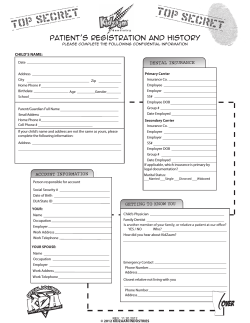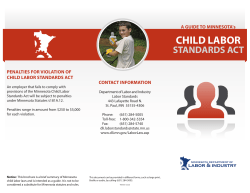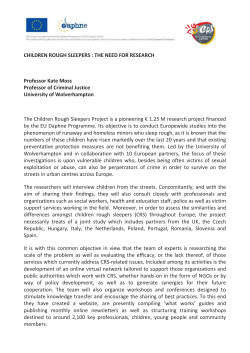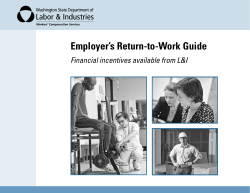
Teens at Work: Facts for Employers, Parents and Teens minor worker
Teens at Work: Facts for Employers, Parents and Teens Many Washington employers hire workers under the age of 18 to work in restaurants, grocery stores and offices, among other non-agricultural jobs. This brochure answers many questions employers, teen workers and parents have about non-agricultural work rules, permits and conditions for working minors. These requirements also apply to teens working in their family’s non-agricultural business. If you have questions this brochure does not answer, visit www.Teenworkers.Lni.wa.gov, e-mail TeenSafety@Lni.wa.gov or call your local Department of Labor & Industries (L&I) office. The information in this brochure covers all industries other than Agriculture. Keep specific information on file for each minor worker An employer must have the following information about each minor worker on file at the minor’s work site: Proof of age A copy of one of the following is required: Birth certificate Driver’s license Baptismal record Notarized statement from parent or legal guardian Personal data Name, address, date of birth and a copy of the minor’s Social Security card. Employment description What does an employer have to do to employ minors? Post a current minor work permit endorsement Employers are responsible for getting a minor work permit endorsement for each work site where they employ minors. They can get one with the Master Business License application. This application can be obtained through the Department of Licensing or any L&I office. The Master Business License with current minor work permit endorsement must be posted, and renewed every year. Earliest and latest work hours, total number of hours of work per week and a complete description of duties. A parent/school authorization form from each minor worker L&I gives this form to the employer. It is also available on L&I’s website at www.Lni.wa.gov/ Forms/pdf/F700-002-000.pdf The parent/school authorization form must be completed by the employer, signed by the parent/ guardian, and by a school representative if the student is working during the school year. It must be kept on file at the minor’s work site. The employer needs to renew the Parent/School Authorization form when it expires every year in September. How old do kids have to be to work? Kids have to be 14 years old to work at non-agricultural jobs. Under limited circumstances and with permission from the county superior court, a youth younger than 14 may be employed. What is the minimum wage for minor workers? The minimum wage for 16- and 17-year-old workers is the same as for adults. Minors under 16 may be paid 85 percent of the state minimum wage. What about meal and rest breaks? Fourteen- and 15-year-old workers may not work more than four hours without a 30-minute uninterrupted meal period. The meal period must be separate from, and in addition to rest breaks. These minors must be provided a paid rest break of at least 10 minutes for every two hours worked. When working a four-hour period, they cannot be required to work more than two hours without either a 10-minute rest break or a 30-minute meal period. Sixteen- and 17-year-old workers are entitled to an uninterrupted meal period of at least 30 minutes when working more than five hours a day. These minors are entitled to at least a 10-minute paid rest break for each four hours worked. They must receive a rest break at least every three hours. When can 16- and 17-year-olds work extra hours? If there is “good cause” why a 16- or 17-year-old needs to work more hours per week than shown on the table below, a variance is possible. Special variance – up to 28 hours per week Many older teens have a reduced school schedule or have shown that they are able to work additional hours on top of their school schedule and extracurricular activities. The parents and the school can grant permission to work up to eight extra hours during the school week. They must complete the special variance section of the Parent/School Authorization form, which is available on online at www.Lni.wa.gov/Forms/pdf/ F700-002-000.pdf or by calling 1-866-219-7321. Regular variance – more than 28 hours per week If the extra hours provided by the special variance are not enough, the business can pursue a regular variance with L&I. The employer originates the request. The form is available at www.Lni.wa.gov/WorkplaceRights/ TeenWorkers/Hours/Variances What hours are teens under 18 allowed to work in non-agricultural jobs? Hours and schedules minors are permitted to work in non-agricultural jobs Hours per day Hours per week Days per week Begin Quit School weeks 3 hours (8 hours Sat.-Sun.) 16 hours 6 days 7 a.m. 7 p.m. Non-school weeks 8 hours 40 hours 6 days 7 a.m. 7 p.m. (9 p.m. June 1 to Labor Day) School weeks 4 hours (8 hours Fri.-Sun.) 20 hours 6 days 7 a.m. 10 p.m. (Midnight Fri.-Sat.) School weeks with a special variance from school 6 hours (8 hours Fri.-Sun.) 28 hours 6 days 7 a.m. 10 p.m. (Midnight Fri.-Sat.) Non-school weeks 8 hours 48 hours 6 days 5 a.m. Midnight 14-15 year-olds 16-17 year-olds Notes: 1. An adult must supervise minors working after 8 p.m. in service occupations, such as restaurants and retail businesses. 2. Overtime rules apply for all hours worked over 40 in one week. 3. These rules also apply to home-schooled teens. Are there exemptions from the rules covering hours of work? Elevators, hoists and cranes. Flagging. A 16- or 17-year-old may work non-school hours during the school year if he/she is married, a parent, possesses a certificate of educational competence (GED), is registered in accredited college courses or is emancipated under Washington State law. Trenching or excavating. What work activities are teens prohibited from doing in non-agricultural jobs? Explosives. Experience has shown some jobs are potentially hazardous for young workers. Washington State and federal laws spell out which jobs are prohibited for minor workers. Boilers or in engine rooms. Power-driven woodworking machines. Earth-moving machines. Mining. Other prohibited duties 17-year-olds may drive only under very limited circumstances. Firefighting. IMPORTANT: All of the following duties are prohibited regardless of the type of industry. Logging and sawmill work. Selling candy, flowers, or other items to motorists on a public roadway. This list includes only the main highlights of the child labor regulations. Refer to WAC 296-125-030 for more detail. Manufacturing of brick, tile and similar products. All minors under 18 are prohibited from doing the following work in any industry: Prohibited duties common to restaurants, delis and grocery stores Operating meat slicers or powered bakery equipment such as a Hobart mixer. Regular driving of motor vehicles to make deliveries, such as pizza delivery. (No driving on public roads for those 16 or under) Driving a forklift. Jobs where exposures require the use of respiratory protection or hearing protection. Work in saunas or massage parlors. Nurses’ aide or nurses’ assistant, unless the minor is in a state-certified training program. Jobs with possible exposure to bodily fluids, or radioactive and hazardous substances. Additional prohibited duties for minors under age 16 (WAC 296-125-033) House-to-house sales. Cooking and baking. Operating or cleaning meat slicers. Working at heights greater than 10 feet off the ground or floor level. Any power-driven machinery. Loading, operating or unloading of paper balers and compactors. Work in freezers, meat coolers and in preparing meats for sale. Manufacturing. Slaughtering, meat packing or food processing. Working alone past 8 p.m. without supervision by someone 18 years or older who is on the premises at all times. Prohibited duties common to constructionrelated activities Roofing – All work on or around a roof. Working at heights greater than 10 feet off the ground or floor level. Wrecking and demolition. Construction. Processing operations. Public messenger. Amusement parks. Loading or unloading trucks. Transportation, warehouse, storage and work around conveyors. Ladders and scaffolds, including window washing. Maintenance and repair in gas stations. What are the penalties for violating nonagricultural child labor laws? Permit revocation L&I can revoke an employer’s minor work permit if proper working conditions are not being met or if there are conditions that are detrimental to the health, safety or welfare of minor workers. Penalties L&I can assess civil penalties up to $1,000 and criminal penalties on employers in violation of child labor laws. The size of the civil penalty depends on the severity of the violation. Violations that result in the death or permanent disability of a child may result in a Class C felony charge. An employer who knowingly or recklessly violates child labor laws may be charged with a gross misdemeanor. Under federal law, child labor violations by employers may be subject to a civil penalty up to $11,000 for each minor worker. In Spanish (en Español) This publication is available in Spanish from the Department of Labor & Industries’ website: www.Lni.wa.gov/IPUB/700-022-999.pdf en Español Esta publicación está disponible en español en el sitio del Internet del Departamento de Labor e Industrias: www.Lni.wa.gov/ IPUB/700-022-999.pdf For more information E-mail TeenSafety@Lni.wa.gov, call your local L&I office or call toll-free 1-866-219-7321. For information on federal laws, contact the U.S. Department of Labor, Wage and Hour Division, at 206-398-8039. www.youthrules.dol.gov www.osha.gov/SLTC/teenworkers Employer checklist Here’s a checklist of what an employer needs when hiring a minor: A minor work permit endorsement A signed parent/school authorization form Proof of minor’s age Personal data and employment description On the Web: Visit the L&I website at: www.TeenWorkers.Lni.wa.gov Other formats for persons with disabilities are available on request. Call 1-800-547-8367. TDD users, call 360-902-5797. L&I is an equal opportunity employer. PUBLICATION F700-022-000 [01-2008]
© Copyright 2025





















